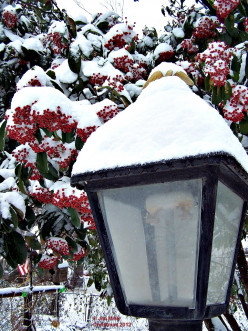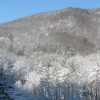Observed effects of global climatic change
Sitting in my one-armed camp chair this afternoon, enjoying a bourbon laced orange juice, the air temperature was about 65 degrees F under a deep azure blue sky lightly washed with high cirrus clouds. A recon patrol of gnats drifted listlessly near my head, while a female mockingbird made a quick snack of a nondescript moth strolling drunkenly across the paving stones. Mobs of grackles and blue jays sat on their respective branches overhead, hurling insults and threats back and forth.
Thing is, this was North Texas, Wichita County, roughly half way between Oklahoma City and Fort Worth, in the middle of January. Really cold days so far this season I could count on one hand, and yet we have had two snows with accumulation approaching 6 inches. From experience I can tell you this is not the weather I grew up with here on the southern Rolling Plains.
I'd be interested in hearing what others have observed in their home stomping grounds that may be caused in part by effects of global warming. And you folks down under in Australia, we're praying hard for ya on this side of the planet!
I know here in Oklahoma that we have been in a bad drought for the past 3 years. Most of the lakes are starting to get really low. People are afraid they will dry up.
We usually have a bit of a drought in winter and summer, but this is bad. They are even beginning to fear for the health of the wildlife as water disappears.
Past that, the winters seem to be getting a little warmer every year. We still get our annual ice storm or blizzard but there is pretty much no snow other than that. The one exception happened a few weeks ago when we had snow that stayed on the ground more than a few hours and wasn't a blizzard.
Since I am so close to you, I imagine the information from my area does not help too much. But it is a topic that has been on my mind lately and I am glad that it is not only this area experiencing changes.Hi, Sarah! Drought conditions across the southwest are indeed the worst since the 1950s, and some areas have exceeded those conditions.
I keep hearing other people say how much the weather is changing.
But honestly, I don't see it as anything unusual in overall weather patterns.
There've always been floods, snows, scalding hot summers, droughts, storms, tornadoes, ice storms, earthquakes, etc.......at various times over the decades. Just because some of those occur within a specific generation doesn't mean it's unusual in the whole scheme of things.
Most of the hoopla about climate change is political propoganda. That's obvious. Duh.....of course the climate is gonna change at intervals; that's a thing called....weather, and natural movements in nature, etc. I hope people will soon learn to stop and think before being conned by liberal activism.
In southwest Idaho I cannot remember so many days near zero since I moved here17 years ago. If I caught it right we are averaging averaging! 20 degrees below normal for the year to date.
Now, if you could just crate up some of that cold and ship it down this way, say, about June or so.....?
Have you noticed any changes in how wet/dry it is in your corner of Idaho?
- scottcgruberposted 12 years ago
0
Here in the DC area I've noticed the fall getting shorter over the past two decades. We usually have a nice warm fall that doesn't really get wintery until December.
Now, summers are as brutal as ever, but they seem to last much longer into September, and the winter chill now begins mid to late November. It seems a lot rainier, too.
Of course, it's difficult to say whether these are long-term changes brought about by human-induced rapid global overheating, or short-term ones caused by global weather cycles. But it's what I've noticed.Hey, Scott! Summers have always been hot here in Texas. Now they are brutally hot; more days over 110, more consecutive days over 100 and less cooling at night.
Aren't the cherry trees in DC blooming earlier?Yes, I forgot about that. You're absolutey right.
We have an annual Cherry Blossom Festival that is timed to coincide with the peak of the cherry trees' blooming, late March to early April. In recent years, the trees have been starting to bloom in February, hitting their peak in early March, and dropping all their petals by early April - right in the middle of the festival
Turns out that there is quite a bit of scientific research on this topic both here in the US and in Japan. I may just have to write about this in a future hub. Thank you for the inspiration!Indeed I have - my Hub on this subject should go live in the next day or so. It turns out that there has been some very interesting research on the impact of climate change on the flowering of DC's cherry blossom trees. Over the past century when they were first planted, the peak blooming date has moved about a week earlier in the year. In the not-too-distant future, we could see this date moving from early April to early March or even late February.
Thank you again for the inspiration!
I'd like to second what scottcgruber mentioned. As I hail from Pennsylvania, in recent years I have noticed the almost complete disappearance of spring and autumn. Winter has become longer, but warmer, with a couple of short, bitter periods. Summer has become even more hot and humid (have to love that humidity) and now extends until around November.
NOAA recently posted an article on their website that 2012 was, globally, the warmest year on record in history. I guess once events progress to the point where they begin to exponentially increase on their own, we're just along for the ride and I'm really not sure there is anything that we, as humans can realistically do anymore. (Don't get me started on how far back global warming actually has its roots. )
)Aw, come on, pitzele, let me get you started! One of my current bedside books is William F. Ruddiman's "Plows, Plagues & Petroleum: How Humans Took Control of the Climate." He takes the position that humans began impacting climate with the advent of rice cultivation and slash-and-burn agriculture.
I would have to agree that it's too late to stop the atmospheric changes already set in motion; nor is the outlook brilliant for significant reduction in further greenhouse gases emissions. But if our species is to survive this millennium, people the world over will need to wake up and take stronger actions to address the situation.
Well Jim TxMiller. I have a problem with this whole global warming thing. Now winters are different and summers too. But how different? I live about 1700 feet above sea level. Shale outcrops all over the place. (Folks here use shale for their driveways instead of gravel). I've studied geology enough to know that where I'm standing was once the bottom of an ocean. I don't know what the temperature was but I know the water was pretty damned deep. Furthermore I don't know where my continent has been. I understand it has traveled a little bit. So it looks to me like the weather has always been changing. Sometimes getting warmer, sometimes colder and sometimes very wet or dry.
I just can't convince myself that I have seen a large enough of a sample to make a conclusion. Good luck with your forum!I certainly don't need to tell you, Gawth, that rational inquiry takes all sides, so I value your input as much as anyone. Personally, I became a "believer" several years back after reading reports by Dr. James Hansen, Bill McKibben and others and began following The Pew Center on Global Climate Change (Pew has since handed off to the Center for Climate and Energy Solutions). I won't further belabor you with background sources here but will gladly provide them to anyone interested.
I agree that some areas have definitely been under water and different temperatures. I know my area has been seeing higher temperatures and less water as of late, but who knows if it was the usual years back. I used to live in an area in central Oklahoma that was woods on complete sand. The sand is full of tiny seashells. I'm guessing it was underwater at some point.
I have been calling it global warming, even if it is just the Earth getting warmer like it had before and/or land moving around.
I am glad that your area, Gawth, is not underwater like it used to be! Maybe it moved upward from some other land going underneath it? I do not know much about geology, but it is a fascinating subject.
The main local is that the traditionally-named June Gloom is now, more often than not, May Gray, making it hard to tell my parents when to visit.
Also, the lakes that froze solid enough to skate on in Pennsylvania where I grew up don't freeze anymore.
Farther afield, the glaciers in Glacier National Park that has been a favorite camping place for my family for three generations? Most of the glaciers in my Dad's and grandfather's slides are just.. GONE. It's really shocking to see how far Athabasca Glacier has retreated in the past twenty yers since I first saw it. The valley it covered is now ice-free.
And there's photos of that glacier going back to the beginning of photography, so they can measure just how fast the retreat's accelerating. The last ten years have been brutal.
Who'd a thunk, when they created a park specifically so that people could visit glaciers in the lower 38, that all its glaciers would disappear in their grandchildren's lifetime? I mean, these were rivers of ice miles and miles long, and hundreds of feet thick that had been around as long as the human race!I have not yet made it to Glacier, but I am very familiar with the story there. You and others, hopefully, may be interested in a recent documentary called Chasing Ice. Thanks for joining in the discussion!
I haven't been to Glacier since I was a young child, so I don't think I'd notice any changes there, but my family traveled regularly to the Black Hills, Yellowstone, and the Colorado Rockies when I was growing up and now my husband and our kids do the same. Unfortunately, thanks to the mountain pine beetle, the parks my kids are seeing are already pretty different from the ones I grew up visiting, and at the current rate I'm afraid they might be completely unrecognizable by the time they take their own children. Every time we go there are more and more dead trees.
Here in Nebraska, we've also gone over the course of just about 12 months from one of the worst floods in living memory to one of the worst droughts. We've had two brutally hot summers in a row and have spent most of this winter see-sawing between frigid cold and unseasonable warmth. Last winter skipped the see-saw and just stuck with the unseasonable warmth. Not that I mind being able to run around in short sleeves for weeks on end in January, but it sure as heck isn't normal! And I definitely do mind weeks on end of temperatures hovering around 100. It's Nebraska, not Death Valley.Thanks, Kerry! I don't always follow temperatures outside of my own region unless they are extreme enough to be reported on in the media. Didn't realize Nebraska was being hit quite that hard, but can't say that I am surprised.
Gawth: read up on plate tectonics. It explains your shale pretty clearly. Living on the RIng of Fire as I do, one is fairly aware of the mechanism. (The people of Japan, sadly, can also tell you what happens when the edge of a plate gets snagged and finally lets go from the stress. Plate Tectonics is powerful.)
Hi, Jim,
Tom in Australia.
We are experiencing the 'unfamiliar' here, too. Hottest day since records began only a week or two back and then two days later it was almost like winter. We've had raging bushfires in the Southeastern States, including the island state of Tasmania - where it was 42 Celcius. Generally it never gets above about 25 down there.
The fires were hardly out when the Northern and Eastern States: Northern Terrritory, Queensland and every half way down New South Wales started to experience the worst floods in years.
This is, of course, a pretty harsh land: drought, fire and flood occur routinely. However, we've had weather phenomena never experienced before in this country, tornedoes, waterspouts. These were things which happend in the US not 'down under.'
Yep, thing are a'changing.Thanks, Tom!
I knew things were heating up down there, had read some about the fires. Did not know, however, about your tornadoes and waterspouts. In what directions do the rotate and travel?
- scottcgruberposted 12 years ago
0
Science is not liberal activism. The fact is that we have altered the climate over the past two centuries.
Doubling the amount of carbon dioxide in the atmosphere and widespread deforestation is not "natural movements in nature."
Maybe you should stop, think, and examine the evidence before being conned by the oil industry.Science? Most of what you call "science" is simply theory.
Sure I can argue with "science"!
For one thing, science hasn't and cannot prove how long the earth has even existed, much less reliably spouting off numbers like millions of years etc.
Here's an interesting article (if you want a "scientific" view. I don't need it, but you might)-------
http://earthguide.ucsd.edu/virtualmuseu … 07_1.shtml
So, even if the earth has existed for millions of years, "climate change" is nothing new, just long periods of time in between those changes, and according to this article, it has occurred many times, loooonng before there was concern about car emissions and "going green" and such. In other words, if it's gonna happen, it's gonna happen eventually no matter what humans do.And in science, the word "theory" means that an idea has been proven beyond reasonable doubt by evidence and experimentation. This is quite different from the colloquial meaning of "theory."
Scientists have proven via radiometric dating of multiple parent/daughter isotope pairs that the Earth is approximately 4.54 billion years old. To say that science "hasn't and cannot prove" this is simply incorrect.
Yes, the Earth has gone through periods of climate change before. This is well-known, and a frequent subject of study by the climatologists who are trying to understand and predict current climate change. You are not revealing anything new.
The Earth has gone through periods when average temperatures were far hotter than they are today and much of the planet was covered in warm seas. There have also been Snowball Earth periods of near-global glaciation. These have been caused by changes in ocean circulation due to the shifting of the continents.
There are also 100,000-year, 41,000-year, and 21,000-year cycles known as Milankovitch cycles produced by regular shifts in Earth's orbit. These have been well-studied and are well-understood by climate scientists.
So?
How does the fact that Earth's climate has changed due to natural factors in the past negate the fact that human activity is causing climate change now?
The earth has been in a state of constant change for around 4 billion years. We have been here doing what we do for a few hundred years. Since humans formed societies and proceeded to engage in industrial activity that is.
Nature goes it's own course regardless of what we do or don't do. Always has and always will. If we get in the way we will be run over and not even be noticed. It takes a lot of arrogance to think that we can make much of an impact on nature and the fate of this planet. The planet will still be changing and going on its merry way long after we are a tiny and insignificant inkspot on its inevitable march through the universe.
Related Discussions
- 27
Is it really possible to reverse the effects of global warming or is it too late
by Michelle Taylor 13 years ago
Is it really possible to reverse the effects of global warming or is it too late?
- 46
The Global Warming Scam has failed. Time for Global Cooling . .
by sannyasinman 15 years ago
Global Cooling and the New World Order ... http://blogs.telegraph.co.uk/news/james … rld-order/
- 30
The Reality of Climate Change
by mbuggieh 11 years ago
About 97% of all scientists accept a simple fact: Human activity on the planet Earth is contributing to global climate change. And as NOAA's National Climatic Data Center indicates: "It is worth noting that increasing global temperature is only one element of observed global climate change....
- 9
science:: climate change
by SparklingJewel 16 years ago
Founder of the Weather Channel, a former Weatherman speaks on Global Warming.http://www.kusi.com/home/78477082.htmlwhat happened to our science section on hubpages forums?
- 34
Global warming - A global warning?
by Pamda Man 16 years ago
I recently did some research on global warming. I found out that the USA is emitting over 25% of the world's polluting gases. These include sulphur dioxide which causes acid rain, and nitrous oxides which causes health problems. I find this very alarming, as the USA, as a developed country, is...
- 166
Does Global Warming or Climate Change Really Exist?
by ThunderKeys 14 years ago
I'm confused. I've read and heard arguments that global warming is really just part of a natural temperature change process for the earth. I've also read that it's completely man-made? Is it one or both of these? Please explain.














